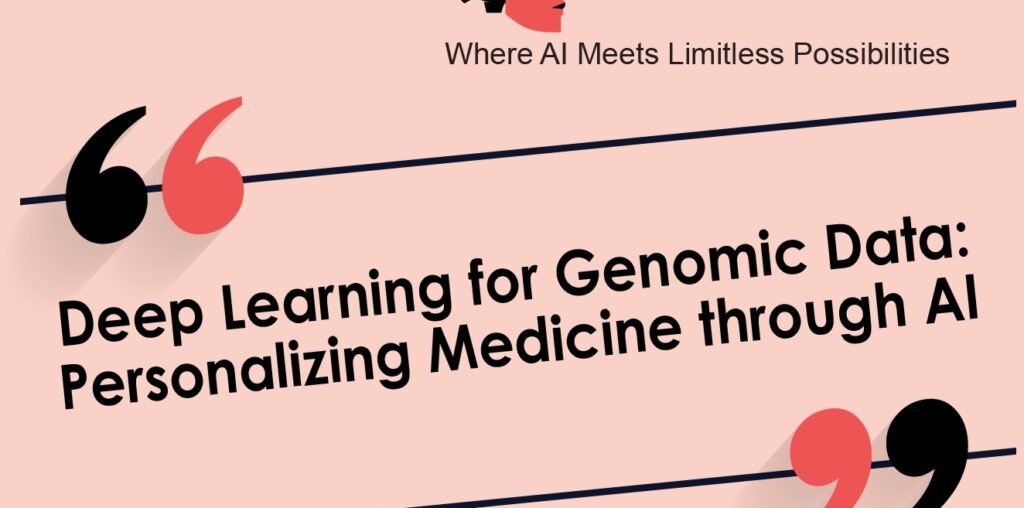The intersection of deep learning and genomic data represents a transformative leap in personalized medicine. As our understanding of genetics advances, deep learning—a subset of artificial intelligence (AI) focused on neural networks and large datasets—is proving to be a powerful tool in decoding the complexities of the human genome. By harnessing deep learning algorithms, researchers and clinicians are now able to analyze genomic data with unprecedented accuracy, leading to more personalized and effective medical treatments.
The Challenge of Genomic Data
Genomic data is immensely rich but also highly complex. The human genome consists of approximately 3 billion base pairs of DNA, with variations across individuals that can influence susceptibility to diseases, drug responses, and overall health. Analyzing this data involves understanding not just the sequences themselves but also the intricate interactions between genes, epigenetic factors, and environmental influences.
Traditional methods of analyzing genomic data often struggle with the scale and complexity of the information. Manual analysis and conventional statistical approaches may fall short in uncovering subtle patterns and relationships. This is where deep learning comes into play, offering new ways to interpret and leverage genomic data for personalized medicine.
Deep Learning and Genomic Data: A Synergistic Approach
Deep learning models, particularly neural networks, are adept at handling large-scale data and identifying patterns within it. These models are designed to learn hierarchical representations of data through multiple layers of processing, making them well-suited for genomic data analysis. Here’s how deep learning is being applied to genomics:
1. Variant Interpretation
Genomic variants—differences in DNA sequences between individuals—play a crucial role in personalized medicine. Deep learning algorithms can analyze large datasets of genomic variants and their associated clinical outcomes to predict the functional impact of new variants. For example, convolutional neural networks (CNNs) can be used to identify pathogenic variants by analyzing the context of these variants within the genome and their potential effects on protein function.
2. Gene Expression Analysis
Understanding gene expression—the process by which genetic information is converted into proteins—is fundamental for studying diseases and developing treatments. Deep learning models, such as recurrent neural networks (RNNs) and long short-term memory (LSTM) networks, can analyze gene expression data from high-throughput technologies like RNA sequencing. These models can uncover complex patterns in gene expression that may be indicative of disease states or therapeutic responses, facilitating the identification of biomarkers and drug targets.
3. Drug Discovery and Development
Deep learning models can significantly accelerate drug discovery by analyzing genomic data to predict how different compounds will interact with specific genetic targets. For instance, deep neural networks can be trained to predict the efficacy and safety of drug candidates based on genomic profiles. This approach not only speeds up the drug development process but also helps in identifying personalized treatment options that are tailored to an individual’s unique genetic makeup.
4. Disease Risk Prediction
Deep learning models can be used to predict an individual’s risk of developing certain diseases based on their genomic data. By integrating genomic information with other data sources, such as electronic health records (EHRs) and lifestyle factors, these models can provide more accurate risk assessments. For example, deep learning algorithms can identify genetic predispositions to diseases like cancer or cardiovascular conditions and predict the likelihood of disease onset, enabling early intervention and personalized preventive strategies.
Challenges and Considerations
While the potential of deep learning in genomics is immense, several challenges need to be addressed:
- Data Quality and Privacy: High-quality genomic data is essential for training accurate deep learning models. Ensuring data privacy and security is also crucial, as genomic information is highly sensitive and personal.
- Interpretability: Deep learning models are often considered “black boxes,” meaning their decision-making processes can be difficult to interpret. Developing methods to explain model predictions and ensure their clinical relevance is important for gaining trust from healthcare professionals and patients.
- Integration with Clinical Practice: Integrating AI-driven insights into routine clinical practice requires collaboration between data scientists and healthcare providers. Developing user-friendly tools and workflows that clinicians can easily adopt is essential for translating AI research into practical applications.
The Future of Deep Learning in Personalized Medicine
The future of deep learning in genomics holds exciting possibilities. As computational power and data availability continue to grow, deep learning models will become increasingly sophisticated, offering even deeper insights into the human genome. Advances in explainable AI and data integration will enhance the clinical applicability of these models, paving the way for more personalized and effective medical interventions.
In conclusion, deep learning is revolutionizing the field of genomics by providing powerful tools for analyzing complex genetic data. From variant interpretation to drug discovery and disease risk prediction, AI-driven approaches are enabling more personalized and precise medical treatments. As technology continues to evolve, deep learning will play a crucial role in advancing personalized medicine, ultimately improving patient outcomes and advancing our understanding of human health.

